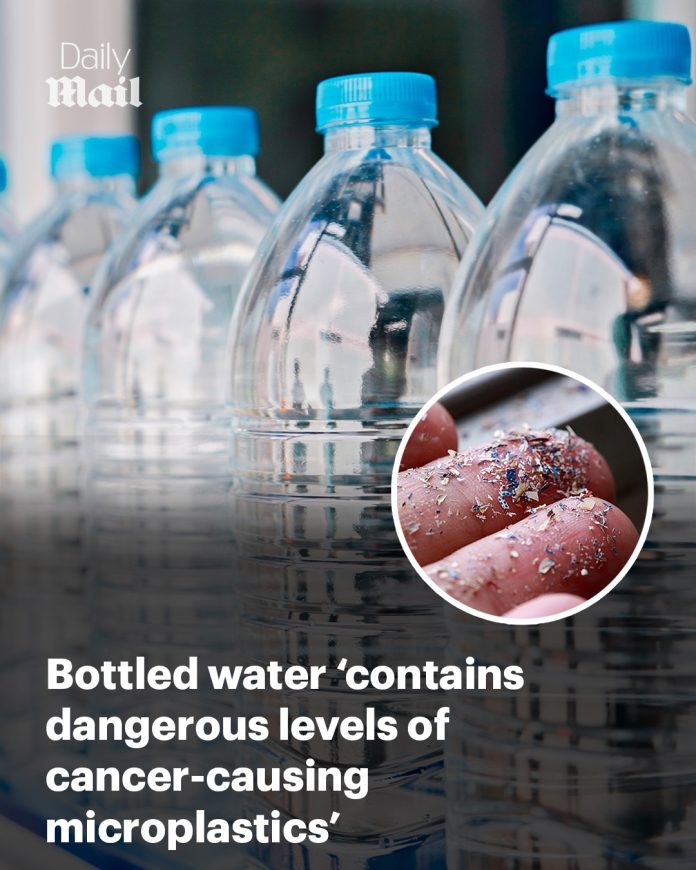Did you know that bottled water contains dangerous microplastics? Read more below. New findings suggest that bottled water may contain potentially harmful amounts of microplastics that can pass through the body’s natural defenses, settle in vital organs, and pose serious long-term health risks, including an increased likelihood of developing cancer.
According to recent environmental research, individuals who consume bottled water regularly are exposed to tens of thousands more microplastic particles each year compared to those who drink tap water. These microscopic plastic fragments, which measure just a few micrometres in size, are invisible to the naked eye but can accumulate within the body over time.
Microplastics: A Hidden Threat in Everyday Life
Microplastics are created when plastic materials degrade through wear, sunlight exposure, or heat. They are now found almost everywhere — in food, water, air, and even in human blood and organs. Over time, these fragments can cause chronic stress to the body, affecting essential systems such as digestion, reproduction, and immunity.

In bottled water, microplastics can originate from the manufacturing process, packaging materials, storage, and transportation. Unlike microplastics that enter food chains through environmental contamination, the ones in bottled water come directly from the source — meaning consumers ingest them without any natural filtration.
Health Consequences of Microplastic Exposure
Scientists have warned that prolonged exposure to microplastics may lead to a wide range of health issues, including oxidative stress, chronic inflammation, hormonal disruption, infertility, neurological damage, and cancer. These particles are so small that they can penetrate tissues and cross biological barriers, lodging themselves deep within the lungs, liver, kidneys, and even the brain.
In recent years, researchers have identified microplastics in placentas, breast milk, and lung tissue, prompting growing alarm over how far they can travel inside the human body. Evidence also suggests that they may interfere with gut bacteria, contributing to digestive problems and immune imbalance.
Environmental expert Sara Sajedi, who led the study, has called the risks associated with single-use plastic bottles “serious” and warned that chronic exposure could have devastating effects over time. She emphasized that while bottled water might be acceptable for emergency use, it should not be a daily habit.
“People must understand that the issue isn’t acute poisoning but chronic toxicity,” Sajedi explained. “It’s the slow, silent buildup in our bodies that poses the greatest danger.”
How Microplastics Affect the Body
Scientists are now beginning to uncover the mechanisms behind this invisible threat. One theory proposes that microplastics carry chemical additives and pollutants that disrupt metabolism and cell function. Another suggests that they create biofilms — thin layers of bacteria and chemical residue — which may alter the gut microbiome and trigger inflammation.

Recent human studies indicate that microplastics can change the composition of gut bacteria, reducing beneficial microbes and encouraging the growth of harmful ones. Such imbalances are increasingly being linked to mental health disorders, metabolic problems, and gastrointestinal diseases.
A Call for Regulation and Awareness
Despite mounting concern, there are still no standardized testing methods or global regulations governing microplastic content in bottled water. This lack of oversight makes it difficult for consumers to know the true level of contamination.
Sajedi and other experts are urging health authorities to review existing laws and enforce stricter regulations on the production, distribution, and disposal of single-use plastics. They also recommend mandatory labeling that informs consumers about the presence of microplastics and their potential effects on health.
“Regulatory measures are essential,” Sajedi said. “We need transparency, accountability, and a long-term strategy to protect both human health and the environment.”
Toward a Sustainable Future
As plastic pollution continues to rise globally, the findings serve as a powerful reminder of how everyday habits — even something as simple as drinking bottled water — can have unseen consequences. Choosing tap water, filtered water, or reusable bottles can dramatically reduce exposure to microplastics and contribute to a healthier planet.
Experts agree that awareness is the first step. By understanding the hidden dangers of plastic consumption, individuals can make informed choices that benefit both their bodies and the environment.

















